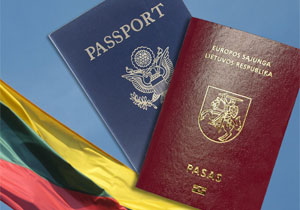- 2013/05/28
EFHR supports double citizenship in Lithuania and prohibition of denaturalisation

On April 16th a proposal came to the Lithuanian Seimas to organise a referendum about the issue of double citizenship along with the presidential election in 2014. The inquiry in the referendum would look as follows: “I agree for the second part of Article 12 of the Constitution of Lithuania to sound as follows: ‘ A citizen of the Republic of Lithuania can be a citizen of another country.’”
The European Foundation of Human Rights (EFHR) proposes that the second and third parts of the Article should sound as follows:
2. A citizen of the Republic of Lithuania can be a citizen of another country.
3. A citizen of the Republic of Lithuania cannot be denaturalised unless he or she renounces the citizenship.
The leader of the opposition, Andrius Kubilius, in his speech during the conference in the Seimas stated that he sees the danger in the way, in which the proposed question was formulated. According to him the phrase “A citizen of the Republic of Lithuania can be a citizen of another country.” is too broad and it can lead to situations, in which in Lithuania, in near future, there may appear many people with Lithuanian and Polish citizenship, or Lithuanian and Russian citizenship. Here Kubilius divided citizens into two categories because he emphasized that Lithuania must, most importantly, think about “the people of Lithuanian origin who live in the United States or Ireland and who want to preserve their citizenship”. The EFHR disapproves this statement, since it stands against Article 29 of the Constitution of the Republic of Lithuania: “one cannot limit human rights or grant privileges basing on a person’s sex, race, nationality, language, origin, social class, religion, opinions or views” and it leads to further division of citizens because of their affiliation to a specific ethnic group or their attachment to another country. The discussion on the topic of double citizenship has continued in Lithuania since the early 1990s. The Constitution of the Republic of Lithuania adopted on October 25th, 1992 by means of a national referendum lifts the prohibition of having double citizenship up to the constitutional level stating that ”apart from exceptional single cases, nobody can be a citizen of the Republic of Lithuania and a citizen of another country at the same time”.
Discussions on the political and social stage were also caused by the decision of the Constitutional Court issued on November 13th, 2006. The Court reminded that a person can be a citizen of Lithuania and a citizen of another country at once only in single cases, described in an act. The law that was valid until the decision was made, allowed people who, until the time of the occupation (June 15th, 1940), had Lithuanian citizenship, as well as their offspring and people of Lithuanian origin to apply for Lithuanian citizenship without the obligation to give up a citizenship of a foreign state, which they had already possessed, but these regulations were declared to stand in conflict with the Constitution and they could not be used in practice.
Additionally, the Constitutional Court in the decision from 2006 pointed out to the statutory division of citizens of Lithuania who are of an origin different than Lithuanian into two groups, which also stands in conflict with the constitution. Those of them who repatriated (i.e. they left the country in order to live in another one or they left to live in their ethnic motherland) could not at the same time be citizens of Lithuania and of another country. In consequence a person, who had had Lithuanian citizenship before June 15th, 1940 and was of Polish origin (the Polish national minority) could have double citizenship only if he or she did not live in Poland but, for instance, in the USA.
The Court did not express an opinion about rights of those citizens who could not, being excluded by the law, apply for Lithuanian citizenship and at the same time preserve their other citizenship.
Two years after the decision on double citizenship was issued by the Constitutional Court, on June 30th, 2008 the Seimas of the Republic of Lithuania voted for a new redaction of the act on citizenship, which, relating to the possibility of having double citizenship in Article 17 act 4 (“The right to keep citizenship of the Republic of Lithuania”) included the possibility of keeping two passports, a Lithuanian one and one of a foreign country, at the same time: “for people of Lithuanian origin traditionally living in countries, with are neighbouring countries for Lithuania”. Additionally Article 16 act 2 (“Losing Lithuanian citizenship”) claimed that the people who “acquired citizenship of a member state of the EU or NATO” do not lose their Lithuanian citizenship. However, the President of the Republic vetoed the bill saying that it stands in conflict with the Constitution of the Republic of Lithuania and at the same time it is an attempt to ignore the strict decision of the Constitutional Court.
The fact that the President has not signed the latest amendment to the act on citizenship eliminated the chances to solve the problem of those Lithuanian citizens who, emigrating for economic reasons, have acquired citizenship of a different country.
Lithuania, a state from which over 10% of citizens emigrated in the past 20 years, should go towards liberalisation of the law related to double citizenship. Only in the last year 419 people were deprived of Lithuanian citizenship through acquisition of another state’s citizenship. 26 people gave their Lithuanian citizenship up on their own free will. Therefore, in only 5 years, 3284 Lithuanian citizens lost their Lithuanian passports.
|
Loss of citizenship |
2008 | 2009 | 2010 | 2011 | 2012 |
| Free resignation from citizenship | 121 | 94 | 60 | 71 | 26 |
| Loss of citizenship by acquisition of another country’s citizenship | 647 | 784 | 519 | 543 | 419 |
| Total number | 768 | 878 | 579 | 614 |
445 |
In the times of demographical crisis in Lithuania, each person living outside of the country, who wants to keep the legal connection with the state should have the right to keep his or her citizenship even in the case of acquiring citizenship of another country. The EFHR believes that Lithuania should follow the example of the newly adopted act on double citizenship in Latvia, where offspring of deportees who live outside Latvia and Latvians who are citizens of UE, NATO and EFTA will be able to apply for double citizenship. The fragment saying that there is a possibility of acquiring citizenship by children born outside the state and having citizenship of a different country should also be used by Lithuania, since in 2012 alone 15,9% of children were born outside Lithuania. Besides, the countries in which there is a significant Lithuanian community (Brazil, South Africa, Australia) should be included in the act on double citizenship. Then, following the example of the Czech Republic, Slovakia and Poland, the Lithuanian Constitution should include a note that would prohibit denaturalisation of citizens.
Therefore, as it was said on the beginning, EFHR proposes the second and third part of the Article 12 of the Constitution of the Republic of Lithuania to sound as follows: “A citizen of the Republic of Lithuania can be a citizen of another country. A citizen of the Republic of Lithuania cannot be denaturalised unless he or she renounces citizenship.”
The discussion about changes in the Constitution gives hope that the problem of double citizenship can be solved in the near future. The EFHR will monitor the progress of the case in the Seimas of the Republic and it will try to propose positive changes, which could be brought by double citizenship with the benefit for the whole Lithuania, its economy, culture and perspectives for future development. As newest survey made by the biggest, in terms of circulation, newspaper Lietuvos Rytas at the end of April of the current year shows that 55% of inhabitants of Lithuania support the acknowledgement of double citizenship and 26% is against it.
Tłumaczenie Emilia Zawieracz w ramach praktyk w Europejskiej Fundacji Praw Człowieka, www.efhr.eu. Translated by Emilia Zawieracz within the framework of a traineeship programme of the European Foundation of Human Rights, www.efhr.eu.




